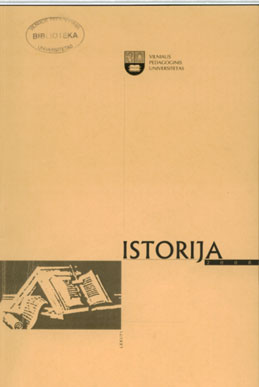Naugarduko žemės teisėjo Jarošo Jevlašauskio (1578-1619) testamentas
The Will of Naugardukas’ Land Judge Jarosz Jewłaszewski (1578-1619)
Author(s): Darius VilimasSubject(s): History
Published by: Vytauto Didžiojo Universitetas
Keywords: the Grand Duchy of Lithuania; legal system; regional gentry elite; testaments; memoir writing; history of the Reformation
Summary/Abstract: The Jewłaszewski family, descended from Naugardukas pavietas (an administrative unit in Poland, Lithuania, Ukraine), became quite famous among the gentry at the end of the 16th-17th centuries. Throughout four generations the representatives of this family rose from the status of an orthodox priest to that of the state elite, i. e. voióvòde. Unfortunately, this stunning career making was arrested by the fact that the last representative of the family died without leaving any descendents. The most eminent from this family (the first who possessed this family name) was the second generation representative, the 17th century memoirs writer Teodor (Fiodor) Jewlaszewski (1546-1619). He worked as a lawyer for some magnate families of the Grand Duchy of Lithuania (Chodkewicz, Radziwiłł, etc); later he took up the position of a senior judge of Naugardukas’ land law court. He left a manuscript of his reminiscences, which were first published only in the 19th century. His son became a judge of the same law court, and his grandson rose to the position of Brasta voióvòde. This publication presents the will of Teodoras’ son, Jarosz (1578-1619). He followed his father’s steps and made a brilliant career in the same Naugardukas land court law. From about 1605 till 1613 he worked as a land clerk, later, till his death – as a land judge. It is interesting to note that he worked in this court law together with his father, and they died the same year. However, the elections to these vacant positions were scheduled at different times. As Teodor Jewłaszewskis will is still missing, Jaroszs published will raises certain interest in several aspects. It contains some intriguing details dealing with household and genealogy such as the family relationships between land and castle court officials, the size of land-ownership, the enumeration of movable property, debts and debtors, some notes on the trade by the river Nemunas, etc. In addition, it presents valuable information for the researchers of the Reformation. Jarosz, like his father, remained an evangelist-reformist. By his will he donated eight valakas (land measuring unit = about 20 ha) of land to a small evangelic church of Dobromyšlis (Dobromysl) in Slanimas (Slonim) pavietas and requested to be buried in its cellar. In his testament he also requested his widow to remain an evangelist-reformist and bring up their children (two sons and a daughter) according to the principles of this faith. Ironically, Jaroszs son Kazimieras became a catholic. The author hopes that the publication of this will and its translation will be of great help to researchers interested in the development of the Reformation and other issues dealing with the history of the Grand Duchy of Lithuania.
Journal: Istorija. Lietuvos aukštųjų mokyklų mokslo darbai
- Issue Year: 71/2008
- Issue No: 3
- Page Range: 30-39
- Page Count: 10
- Language: Lithuanian

